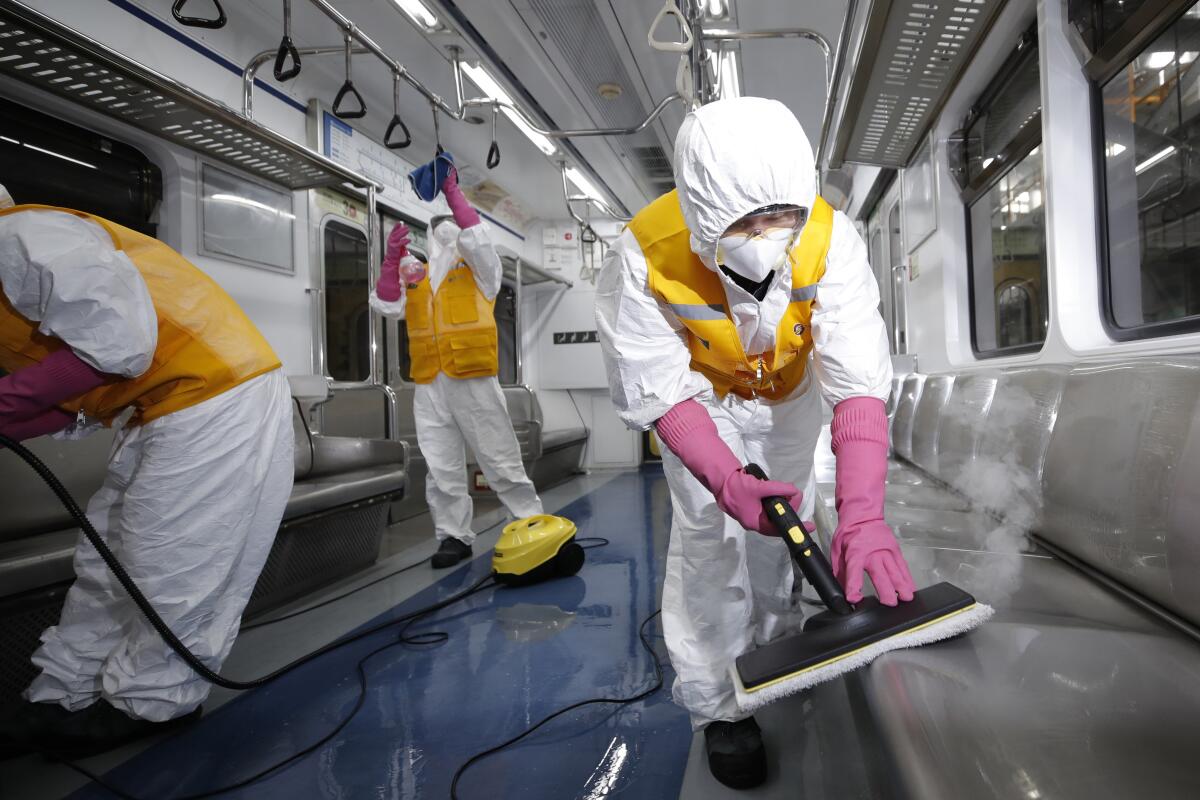Op-Ed: Maybe COVID-19 will remind us why government is not the enemy

- Share via
After the stock market collapsed in late 1929, many people in the United States lost their jobs. By 1932, one in four Americans was suffering from lack of food.
President Hoover, enamored of the efficiency of the private market and suspicious of all foreign countries, raised tariffs and waited, confident that the market would recover and all would be well again. Government intervention, he warned, would plunge the country “into socialism and collectivism.” The world seemed dark.
With the COVID-19 crisis growing worse by the hour, the federal government’s colossal mishandling of it from the start — with faulty and too few tests and President Trump’s false claims that the virus was contained — may finally wake up our complacent country.
We desperately need competence and courage in our government. In 1932, Franklin Roosevelt trumpeted this message before cheering crowds, and went on to swiftly create a set of government structures based on the idea that government planning and support are necessary to keep us safe, provide opportunities to all, and ensure that no one is left out. It’s too bad that it takes a crisis to remind us what government is good for, but that’s where we are today.
Following the Reagan era and 40 years of steady hollowing-out of government, the very idea that the public sector is relevant to our well-being has become unpopular. Many Americans seem to view government as an impediment to the American dream, an old-fashioned, incompetent extractor of taxes that is to be evaded and ridiculed. In a vicious and largely invisible cycle, popular contempt has led to government agencies not having the money and talent they need to do what needs to be done.
Now the bill is coming due. And although the public health crisis we are living through is top-of-mind today, there are innumerable similar failures all around — perhaps none bigger than our collective blindness to our unavoidable need to adapt to climate change.
Rapidly accelerating sea-level rise, river flooding and extreme heat are affecting communities across the country. Other countries are taking this seriously. Singapore plans to spend $75 billion in short order to ensure it is able to survive rising temperatures and floodwaters. The Dutch are planning decades ahead, even considering having to move east to save their country.
And us? Local governments, at best unsupported and often actively opposed by the federal government, are doing their best to plan for climate change. But they don’t have the resources to pay for protective infrastructure or to build new communities in high, dry, and connected places, where both transit and internet access are high-quality and inexpensive. We are ambling toward an apocalypse with every passing month.
Even with something as basic as high-speed internet access infrastructure, Americans lag behind — and seem to not even realize it. This week, businesses and schools started sending everyone home, telling them to do their work and learning online. But the vast majority of Americans do not have reliable, high-capacity, fiber-based internet access to participate remotely in conference rooms or classrooms.
Why? Because of our confidence that America leads the world when it comes to online innovation, and our collective disdain for any role for government in this sector, we have steadily become a Third World nation when it comes to communications.
For contrast, consider South Korea, which raised itself from rubble over a few decades and has built fiber internet access everywhere. Its government knew that affordable communications networks would never be made available by an unconstrained private market. Public investment and planning made a fully connected society possible. South Koreans are shocked when they come to the U.S., where connectivity is so limited that many feel as if they are taking a rural vacation.
South Korea is a country that plans for and supports basic infrastructure, including for public health. It is no coincidence that when the virus arrived, South Korea was ready with tens of thousands of tests, including drive-through testing sites. The Atlantic reported on Monday that fewer than 5,000 Americans had been tested. By this same point in their outbreak, South Korea had tested more than 100,000 people, in a country with a population a fifth the size of ours.
What is government good for? Just ask the founders. It’s supposed to keep us safe and ensure that we have opportunities to thrive.
We have forgotten this message before. It took the catastrophe of the 1906 San Francisco earthquake and the ensuing financial crisis to convince Americans from every walk of political life that a federal income tax would be a good idea. In the face of instability and suffering, everyone remembered that Americans were all in this together.
The current health crisis is a moment that should not be wasted. We need a well-funded, well-functioning public sector that attracts our finest minds. “This great nation will endure as it has endured,” F.D.R. said at his inauguration in 1933. Maybe. But we will need to change our ways to make those words come true.
Susan Crawford is a professor at Harvard Law School and the author of “Fiber: The Coming Tech Revolution and Why America Might Miss It.”
More to Read
A cure for the common opinion
Get thought-provoking perspectives with our weekly newsletter.
You may occasionally receive promotional content from the Los Angeles Times.










